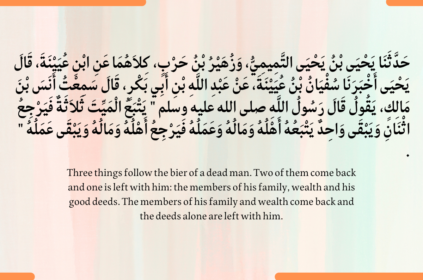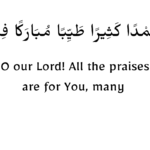بِسْمِ ٱللَّٰهِ ٱلرَّحْمَٰنِ ٱلرَّحِيمِ
The Forbidden Request for Death
In Islam, the prohibition of requesting death is explicit, considering it a major sin. Muslims must exhibit patience in the face of hardships and are obligated to place their trust in Allah’s timing.
The Quran provides spiritual guidance, stating, ‘And do not desire death—for indeed, you will be meeting your Lord!’.
This clarifies that death is an ineffable matter, and it is Allah’s prerogative to determine when and how one should pass away. Furthermore, seeking death can have serious consequence. Taking one’s life is never permitted and can result in eternal damnation, given that Allah’s mercy transcends earthly understanding.
Thus, wisdom dictates finding solace in prayer and practicing patience, trusting that Allah’s will shall unfold in due time.
Hadith Regarding The Prohibition of Requesting Death
حَدَّثَنَا مُحَمَّدُ بْنُ رَافِعٍ، حَدَّثَنَا عَبْدُ الرَّزَّاقِ، أَخْبَرَنَا مَعْمَرٌ، عَنْ هَمَّامِ بْنِ مُنَبِّهٍ، قَالَ هَذَا مَا حَدَّثَنَا أَبُو هُرَيْرَةَ، عَنْ رَسُولِ اللَّهِ صلى الله عليه وسلم فَذَكَرَ أَحَادِيثَ مِنْهَا وَقَالَ رَسُولُ اللَّهِ صلى الله عليه وسلم “ لاَ يَتَمَنَّى أَحَدُكُمُ الْمَوْتَ وَلاَ يَدْعُ بِهِ مِنْ قَبْلِ أَنْ يَأْتِيَهُ إِنَّهُ إِذَا مَاتَ أَحَدُكُمُ انْقَطَعَ عَمَلُهُ وَإِنَّهُ لاَ يَزِيدُ الْمُؤْمِنَ عُمْرُهُ إِلاَّ خَيْرًا ” .
Hammam b. Munabbih said: Abu Huraira narrated to us a hadith from Allah’s Messenger (ﷺ) and out of these one is that Allah’s Messenger (ﷺ) said: None amongst you should make a request for death, and do not call for it before it comes, for when any one of you dies, he ceases (to do good) deeds and the life of a believer is not prolonged but for goodness.
Source: Sahih Muslim 2682
Narrated by: Abu Hurairah (RA)
Understanding the Wisdom
Understanding the wisdom behind the prohibition of requesting death is a significant branch of knowledge. Commonly accepted is the notion that a believer’s life on earth serves as a period of testing. It will be the determining factor for the ultimate reward in the afterlife.
It is assumed that a person will continue to perform good deeds, enhancing their place in Akhirah. Up until when death comes for the person. The cessation of such deeds when leaving the worldly life may seem counterintuitive; however, the underlying wisdom is often overlooked.
Prolonging a believer’s life for goodness in this world is actually beneficial for them in the hereafter.
Whether through good deeds or learning something beneficial, continuing to strive in a good path, reflects upon the ultimate reward. It presents more opportunities for one to collect its fruits.
Consequently, by reflecting on the afterlife and one’s ultimate objective, a believer may limit the inclination of requesting death. The person can redirect their focus towards strengthening their faith instead.
Value of Continuing Good Deeds
Understanding the importance of the cessation of deeds after death is one of the foremost aspects of continuing good deeds.
It is certain and proven that a person cannot benefit from their deeds after death or make use of them. After death, their accounts are closed, and they do not have any further influence or authority over their affairs.

However, even though a person can no longer benefit from their deeds after they die, those deeds can still benefit others during their lifetime. This can be a source of perpetual rewards for them.
Do not underestimate the significance of the perpetual benefits of good deeds, as it is often from the virtuous actions of others that one may reap the rewards in the hereafter.
In this respect, it is important to be mindful that every single lifetime opportunity for righteousness is an opportunity to reap multiple rewards and to increase one’s chances for salvation in the hereafter.
Therefore, each and every one of us should prioritize taking full advantage and making use of every chance to do good.
The Spiritual Significance
People often say that death can motivate us to put life into perspective and focus on what’s truly meaningful.
With death always looming, it encourages a spiritual focus over worldly wants and needs because nothing matters more than our connection with Allah and our relationship with what He has created.
It serves as a stark reminder of mortality and the need to make the most of our life on earth.
Death invites us to accumulate as many good deeds as possible in a lifetime, strengthen our connection to Allah, and use life as a powerful opportunity for spiritual growth.
It’s crucial that we take this message onboard and use it to reassess our views on life and death, developing a deeper understanding of Allah’s plans and purpose.
Prohibition of Requesting Death: Islamic Perspective on Death
The Islamic belief system considers death a fundamental element. According to Islamic teachings, death is the ultimate truth and an inevitability that all must face, irrespective of material or spiritual accomplishments.
Muslims believe that life is short and limited, and death is something that cannot be postponed. The Quran clearly states that every soul will taste death.

Islamic teachings on death encompass two integral aspects: the afterlife and accountability for deeds.
Muslims accept that there is a spiritual life beyond the physical world, and every individual will be accountable for their deeds in the afterlife. Muslims firmly believe in the idea of a Day of Judgment, when each of us will be rewarded or punished based on our deeds in this life.
Death is seen as an intermediary state between two eternal lives. While physical death may take away one’s physical life, spiritual death can mean living eternally in the punishment of Allah.
Conclusion About The Prohibition of Requesting Death
In conclusion, grasping the profound wisdom behind the prohibition of requesting death and recognizing the cessation of deeds after death compels us to actively embrace the duration of life as a priceless opportunity.
By actively prioritizing continuous goodness and growth, individuals can actively cultivate a lasting legacy of positive impact. It is imperative to actively approach life with patience and unwavering trust in Allah’s divine plan. We must as well actively acknowledge that every trial and tribulation serves as a stepping stone toward spiritual elevation.
To actively navigate this journey successfully, one must actively remain committed to righteous deeds throughout life. The active practice of virtuous actions not only enriches personal spirituality but also actively becomes a beacon of guidance for others.
As we actively tread the path of life, let us actively anchor ourselves in the principles of patience, trust, and perpetual goodness, ensuring that our actions actively align with the values ordained by Allah. May our lives actively be a testament to the enduring power of faith, resilience, and unwavering commitment to righteousness.
As always, do share this article out to all of your family and friends. May it be one of the long lasting good deeds that rewards us well. Here and in the hereafter, InsyaAllah.











